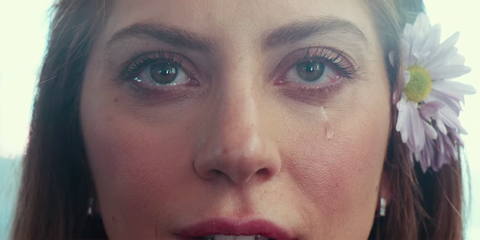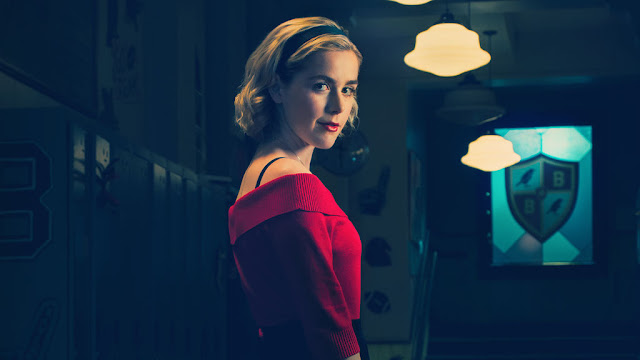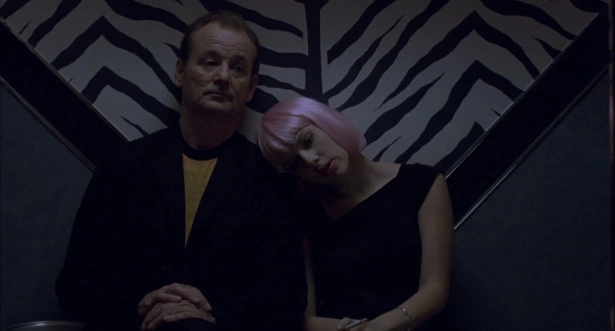"Bradley Cooper? We love him for some reason." - BoJack Horseman
Lady Gaga in A Star Is Born
Last Wednesday (the 10th, to be exact) I saw Bradley Cooper's A Star Is Born. The film stars Bradley Cooper as Jackson Maine, an alcoholic drug addict who also just so happens to be one of the biggest names in music, and Lady Gaga as Ally, a feisty, hardworking, and incredibly talented waitress who somehow hasn't become famous yet (she says record companies hate her nose). To review the movie first: it's fantastic. Both leads provide entrancing performances despite the obstacles to overcome to be in this film, that Cooper is not a singer and Lady Gaga is not an actress. Every song, even ones meant to be unappealing ("Why Did You Do That?") are at the very least earworms, and at the very most instant classics ("Shallow," "Music to My Eyes," and "Look What I Found"). It’s at its core a tragic love story, one where in order for one to fly, the other must fall, and it completely delivers in this department. I will not be shocked if it is nominated for, and wins, several awards.
Jackson Maine is an all-too-familiar character: his mother died at childbirth, his father was 60 when Jackson was born, his brother raised him, he drinks too much and takes medication, he is a tragic hero in every sense; by giving Ally a chance to sing, he shows his virtuosity, only to have his addictive personality cause his downfall. The first half of the film paints him as a symbol of good despite his pride, shown in his refusal to wear his prescribed hearing aids and lashing out at his brother, with his sweetness permeating out of the screen. Jackson is awkward when speaking to Ally for the first time, he is, ironically, starstruck; he performs for and signs the breasts of a drag queen he barely knows, and even offers Ally free tickets to his next show. If Jackson was supposed to be unlikeable, it certainly does not come across, at least not in the first half of the film.
The second half of the film is fast, slightly confusing, and abrupt; it is meant to mirror Ally’s rise to fame. While shots or scenes focusing on Jackson are filmed intimately, with the camera typically in close up, the second half of the film has more medium and full shots. Scenes with Jackson are still intimate, but not for the same reason. That intimacy in the beginning of the film is meant to convey Jackson’s down to earth personality, that he is personal, that he is “real.” The more artificial Ally becomes in his eyes, the more this intimacy of shots is uncomfortable; he sweats profusely, each shot looking more unappealing than the next when compared to the clean, medium and full shots of Ally. Jackson does nothing but embarrass himself in the movie’s third act, calling Ally ugly and completely ruining her Grammy win. It’s shocking just how well Bradley Cooper is able to be so sweet, so unwavering in his kindness and then yell, fight, lie, and drink until his thoughts are no longer his own.
But, if he is the dying star, and Ally is rising from his ashes, then where is the depth of her story? Critic Jourdain Searles writes of this aspect “As soon as Ally becomes a star, she loses focus. That’s also, incidentally, around the time I realized the biggest difference between this Star and the ones that came before it: This one centers the man, not the woman. The film isn’t about Ally’s rise to stardom—it’s about how Jackson reacts to it.” She’s not entirely wrong, especially in regards to the second half of the film; however, in the first half, Ally is just as much of the focal point of the film as Jackson, maybe even more so. She is the character in the focus of the title shot, one that lingers and evokes nostalgia for a time of romantic cinema: her voice is soft, the title the passionate red of the film’s central romance, the lighting dark with shadows surrounding our titular star.
Ally is as feisty as I’m sure Gaga herself is, willing to punch a man bothering Jackson in a bar, yell at her boss, and even quit her job to see a concert. She is clearly a powerful character, her grand voice demanding the spotlight, her presence demanding to be the center of every shot she is in. Ally is the passion that Jackson once had, she is the new talent that he desperately longs for, yet her rise to fame seems to lack the focus it should. Of course, this lack of focus symbolizes the whirlwind and confusion Ally herself experiences with her rise to fame, but for an audience this choice makes the film seem almost rushed. Her fame feels too fast, with so many scenes of Jackson and Ally performing at his concerts taking away time from her rise and his respective fall.
This pacing choice is what makes Ally’s character feel so separate from the film that is supposed to be about her. She loses that ferocity, instead rushing to Jackson’s side after every performance and forgiving him after mistake. Maybe that’s what true love is, or maybe that’s what desperately seeking validation due to co-dependence looks like. It is an odd shift, one that distracts one from the character we were introduced to. Ally has her shining moment in the film’s final scene, where she performs a song dedicated to Jackson. The scene is beautiful, the orchestra playing majestically under Ally’s loving voice, but the scene cuts back to Jackson performing the song for Ally. It is impactful to see Jackson one last time, doing what he loved most for the person he loved the most; yet, it again takes the focus away from Ally, it is one last time of Jackson inserting himself into her narrative, no matter how much it devastates the audience to see him again. Jackson is a great character, but Ally is the one with potential in and out of the story; her character feels as if it’s missing the crucial development that Jackson has, the important conversations he has with those wiser than him, the lessons he learns, everything that makes him a star.
Thank you to my patrons:
B. Bird Person
Twitter: https://twitter.com/MeganRo1110
Instagram: https://www.instagram.com/meganr1110/


Comments
Post a Comment